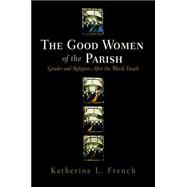The Good Women of the Parish
, by French, Katherine L.- ISBN: 9780812240535 | 0812240537
- Cover: Hardcover
- Copyright: 11/30/2007
There was immense social and economic upheaval between the Black Death and the English Reformation, and contemporary writers often equated this upheaval with immorality, singling out women's behavior for particular blame. Late medieval moral treatises and sermons increasingly connected good behavior for women with Christianity, and their failure to conform to sin. Katherine L. French argues, however, that medieval laywomen both coped with the chaotic changes following the plague and justified their own changing behavior by participating in local religion. Through active engagement in the parish church, the basic unit of public worship, women promoted and validated their own interests and responsibilities. Scholarship on medieval women's religious experiences has focused primarily on elite women, nuns, and mystics who either were literate enough to leave written records of their religious ideas and behavior or had access to literate men who did this for them. Most women, however, were not literate, were not members of religious orders, and did not have private confessors. As The Good Women of the Parish shows, the great majority of women practiced their religion in a parish church. By looking at women's contributions to parish maintenance, the ways they shaped the liturgy and church seating arrangements, and their increasing opportunities for collective action in all-women's groups, the book argues that gendered behavior was central to parish life and that women's parish activities gave them increasing visibility and even on occasion authority. In the face of demands for silence, modesty, and passivity, women of every social status used religious practices as an important source of self-expression, creativity, and agency.






